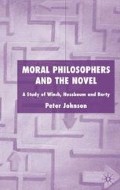Abstract
Reflection on ethics and literature is an education in contrasts. Winch treats the novel as a source of examples, important because of their capacity to throw philosophical argument about moral life into relief. Nussbaum, in her predominant mode, sees literature as essential to the central question of ethics — what kind of life should I/we live? Rorty turns to the novel as an edifying example, a distinctive and often unsettling way of increasing our sensitivity to others, and possibly, our solidarity with them. But what is it for moral philosophers to find a novel edifying? To be edified is not merely to be entertained or amused, even though both may contribute to instruction. An edifying example is not the same as one that convinces. Indeed, in the sceptical ironist vocabulary the phrase “you’ve convinced me” looks unwanted, as neither necessary nor welcome.
Access this chapter
Tax calculation will be finalised at checkout
Purchases are for personal use only
Preview
Unable to display preview. Download preview PDF.
Notes
R. Rorty, Philosophy and Social Hope, (Harmondsworth: Penguin Books, 1999), p. 88.
D. J. Enright, The Alluring Problem, An Essay on Irony, (Oxford: Oxford University Press, 1986), pp. 32–3.
Colin McGinn, ‘The Meaning and Morality of Lolita’, Philosophical Forum, 30 (1999) 36.
Søren Kierkegaard, The Concept of Irony, edited and translated by Howard V. Hong and Edna H. Hong, (Princeton: Princeton University Press, 1989), p. 270.
David Rampton, Vladimir Nabokov, (London: Macmillan, 1993), p. 100.
Author information
Authors and Affiliations
Copyright information
© 2004 Peter Johnson
About this chapter
Cite this chapter
Johnson, P. (2004). Versions of Events. In: Moral Philosophers and the Novel. Palgrave Macmillan, London. https://doi.org/10.1057/9780230503373_10
Download citation
DOI: https://doi.org/10.1057/9780230503373_10
Publisher Name: Palgrave Macmillan, London
Print ISBN: 978-1-349-51669-8
Online ISBN: 978-0-230-50337-3
eBook Packages: Palgrave Religion & Philosophy CollectionPhilosophy and Religion (R0)

